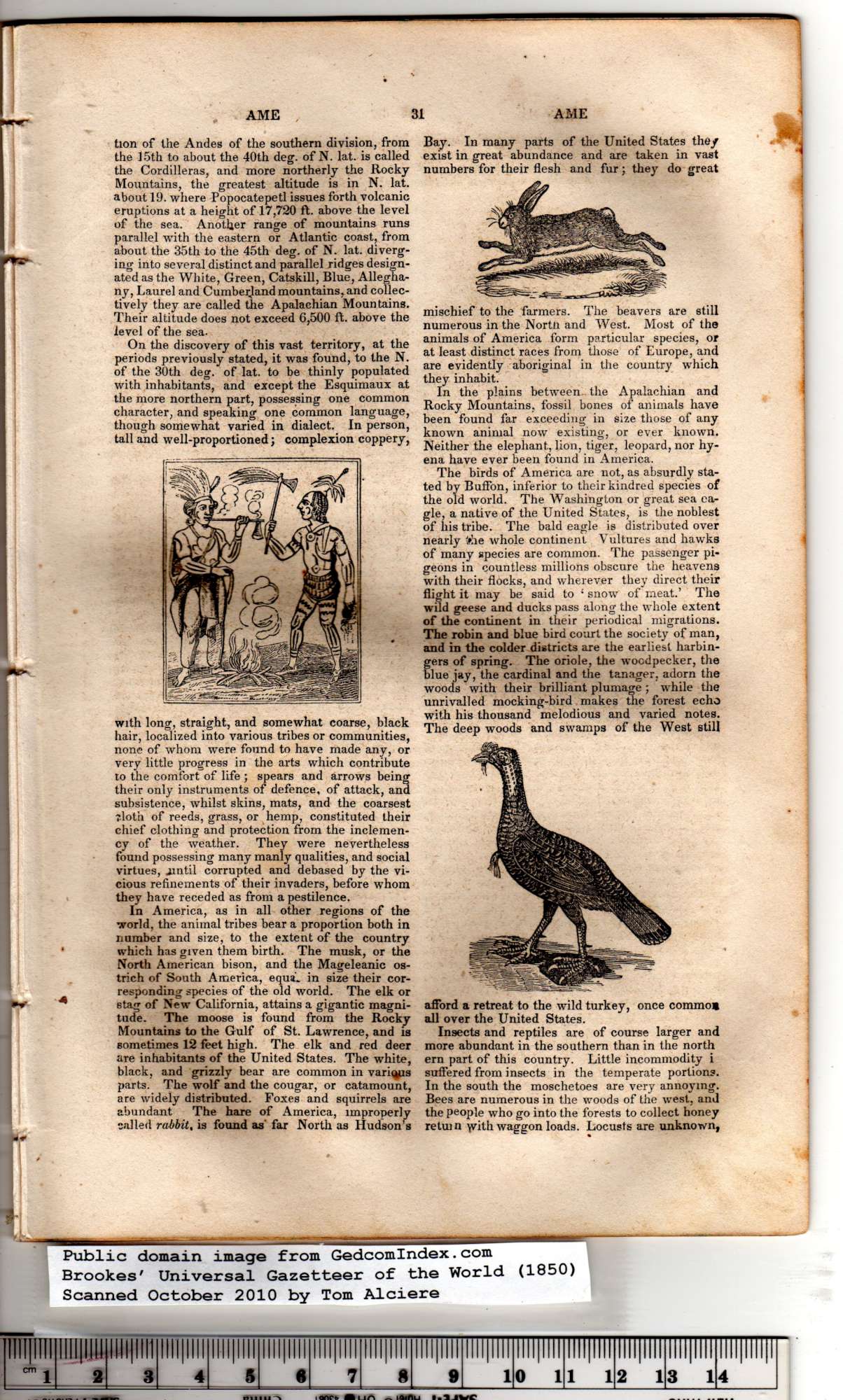|
tion of the Andes of the southern division, from
the 15th to about the 40th deg. of N. lat. is called
the Cordilleras, and more northerly the Rocky
Mountains, the greatest altitude is in N. lat.
about 19. where Popocatepetl issues forth volcanic
eruptions at a height of 17,720 ft. above the level
of the sea. Another range of mountains runs
parallel with the eastern or Atlantic coast, from
about the 35th to the 45th deg. of N. lat. diverg-
ing into several distinct and parallel ridges design-
ated as the White, Green, Catskill, Blue, Allegha-
ny, Laurel and Cumberland mountains, and collec-
tively they are called the Apalachian Mountains.
Their altitude does not exceed 6,500 ft. above the
level of the sea.
On the discovery of this vast territory, at the
periods previously stated, it was found, to the N.
of the 30th deg. of lat. to be thinly populated
with inhabitants, and except the Esquimaux at
the more northern part, possessing one common
character, and speaking one common language,
though somewhat varied in dialect. In person,
tall and well-proportioned; complexion coppery,
Bay. In many parts of the United States they
exist in great abundance and are taken in vast
numbers for their flesh and fur; they do great
with long, straight, and somewhat coarse, black
hair, localized into various tribes or communities,
none of whom were found to have made any, or
very little progress in the arts which contribute
to the comfort of life ; spears and arrows being
their only instruments of defence, of attack, and
subsistence, whilst skins, mats, and the coarsest
?.loth of reeds, grass, or hemp, constituted their
chief clothing and protection from the inclemen-
cy of the weather. They were nevertheless
found possessing many manly qualities, and social
virtues, ointil corrupted and debased by the vi-
cious refinements of their invaders, before whom
they have receded as from a pestilence.
In America, as in all other regions of the
world, the animal tribes bear a proportion both in
number and size, to the extent of the country
which has given them birth. The musk, or the
North American bison, and the Mageleanic os-
trich of South America, equal in size their cor-
responding species of the old world. The elk or
stag of New California, attains a gigantic magni-
tude. The moose is found from the Rocky
Mountains to the Gulf of St. Lawrence, and is
sometimes 12 feet high. The elk and red deer
are inhabitants of the United States. The white,
black, and grizzly bear are common in various
parts. The wolf and the cougar, or catamount,
are widely distributed. Foxes and squirrels are
abundant The hare of America, improperly
called rabbit, is found as' far North as Hudson’s
mischief to the farmers. The beavers are still
numerous in the Nortn and West. Most of the
animals of America form particular species, or
at least distinct races from those of Europe, and
are evidently aboriginal in the country which
they inhabit. |
In the plains between the Apalachian and
Rocky Mountains, fossil bones of animals have
been found far exceeding in size those of any
known animal now existing, or ever known.
Neither the elephant, lion, tiger, leopard, nor hy-
ena have ever been found in America.
The birds of America are not, as absurdly sta-
ted by Buffon, inferior to their kindred species of
the old world. The Washington or great sea ea-
gle, a native of the United States, is the noblest
of his tribe. The bald eagle is distributed over
nearly ttlie whole continent Vultures and hawks
of many species are common. The passenger pi-
geons in countless millions obscure the heavens
with their flocks, and wherever they direct their
flight it may be said to xe2x80x98 snow of meat.’ The
wild geese and ducks pass along the whole extent
of the continent in their periodical migrations.
The robin and blue bird court the society of man,
and in the colder districts are the earliest harbin-
fers of spring. The oriole, the woodpecker, the
lue jay, the cardinal and the tanager, adorn the
woods with their brilliant plumage; while the
unrivalled mocking-bird makes the forest echo
with his thousand melodious and varied notes.
The deep woods and swamps of the West still
afford a retreat to the wild turkey, once commo*
all over the United States.
Insects and reptiles are of course larger and
more abundant in the southern than in the north
era part of this country. Little incommodity i
suffered from insects in the temperate portions.
In the south the moschetoes are very annoying.
Bees are numerous in the woods of the west, and
the people who go into the forests to collect honey
return vith waggon loads. Locusts are unknown, |
